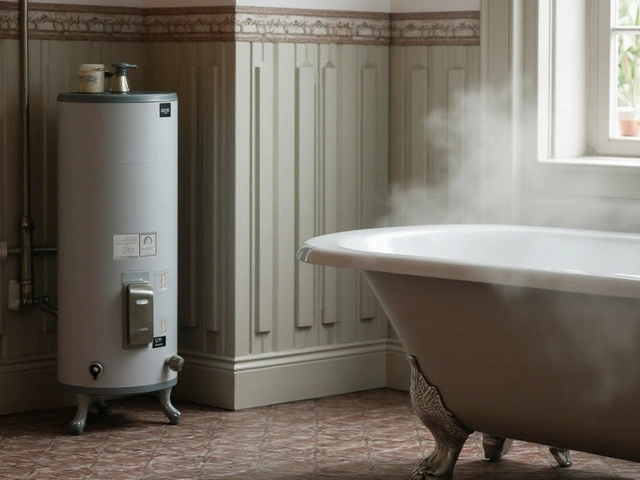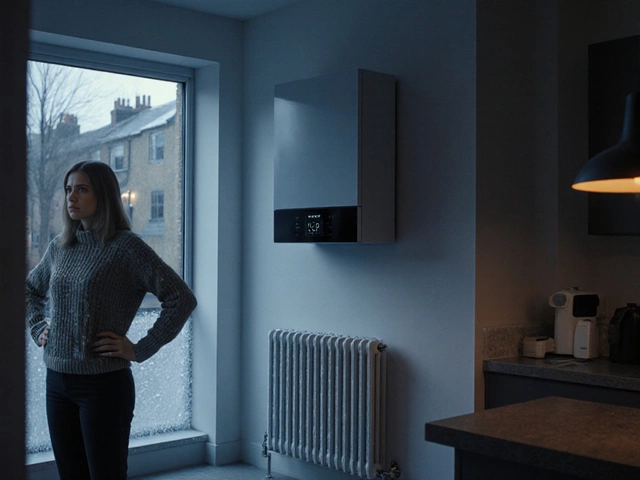When the temperature drops, it’s tempting to crank up the heat. But a warm home can turn dangerous fast if you ignore simple safety steps. Below are the everyday checks that keep heat pumps, boilers and water heaters running safely.
First, watch for odd smells or noises. A whistling heat pump, rattling boiler or sizzling water heater often means something is off. Turn off the unit, let it cool, and look for loose parts or dust build‑up. A quick vacuum or a wipe‑down can solve many issues.
Second, never block vents or registers. Air needs a clear path to move, and a blocked vent can cause overheating or carbon monoxide build‑up. Keep furniture, curtains and rugs at least a foot away from any opening.
Third, test carbon monoxide (CO) detectors every month. CO is silent but lethal, and a faulty boiler or furnace can leak it. Replace batteries twice a year and swap out detectors every five years.
Fourth, check for water leaks around boilers and hot water tanks. Leaking water can rust components, lower efficiency, and create slip hazards. If you see damp spots, tighten connections or call a technician.
Fifth, keep flammable items far from heating equipment. Paper, cleaning chemicals and even laundry piles can ignite if they touch a hot surface. Store them in a safe spot, not on top of a radiator or near a heat pump coil.
If a unit won’t start after a simple reset, or if error codes keep flashing, it’s time to call an expert. Heat pumps that lose heat output, boilers that cycle on and off constantly, or water heaters that take forever to warm up usually need a trained technician.
Schedule a yearly service for every heating appliance. A professional will clean burners, check pressure valves and confirm that safety switches work. Regular service not only prevents breakdowns but also keeps insurance happy.
Don’t try to repair gas lines, pressure tanks or electrical wiring yourself. Those jobs require certified engineers and can be life‑threatening if done wrong. Instead, turn off the main supply, note the issue, and arrange a visit.
Finally, keep a simple log of maintenance dates, filter changes and any odd behavior you notice. When a pro arrives, the log gives them a clear picture and speeds up the fix.
Staying safe while heating your home is mostly about paying attention and doing quick checks. A clear vent, a fresh CO detector battery and a yearly professional service go a long way. Follow these steps and you’ll enjoy cozy evenings without worrying about hidden dangers.

Discover when to worry about your boiler, warning signs to watch, and smart tips for safe use. Get practical advice to avoid major boiler headaches.

Replacing an extractor fan might seem challenging, but with the right tools and some guidance, it can be done efficiently. This guide outlines the process of replacing an extractor fan, from identifying signs it needs replacement to understanding how to choose the right model. Learn practical tips for handling installation and maintaining safety during the project. Make this task more approachable with easy-to-follow steps designed for beginners.

This article delves into the debate between Rheem and AO Smith water heaters, two titans in the world of home appliances. It provides a comprehensive comparison, exploring key aspects like energy efficiency, durability, and cost-effectiveness. It also highlights some interesting facts and practical tips to help you choose the right water heater for your needs. Whether you're looking to upgrade your system or repair your current unit, this guide aims to provide valuable insights.

Unravel the mysteries of oven troubles with a comprehensive guide that walks you through common issues and their solutions. From unexpected cold spots to issues with heating elements, this article explores practical approaches to diagnosing and fixing your oven. Learn about signs to watch out for, potential tools needed, and tips to maintain your oven's optimal performance. Perfect for homeowners who want to save a little cash and feel empowered to tackle minor repairs before calling in the professionals. This guide makes oven repair accessible and doable for the average person.

A practical UK guide that tells you exactly who to call when your boiler fails, how to verify a qualified engineer, and what steps to take before and after the repair.

A 40-year-old boiler can pose potential safety risks. Understanding the wear and tear it undergoes over the decades is crucial. Regular maintenance and safety checks are essential to ensure it operates safely. Homeowners should consider the pros and cons of keeping such an old appliance. Discover tips and advice on making informed decisions regarding your boiler's safety and efficiency.